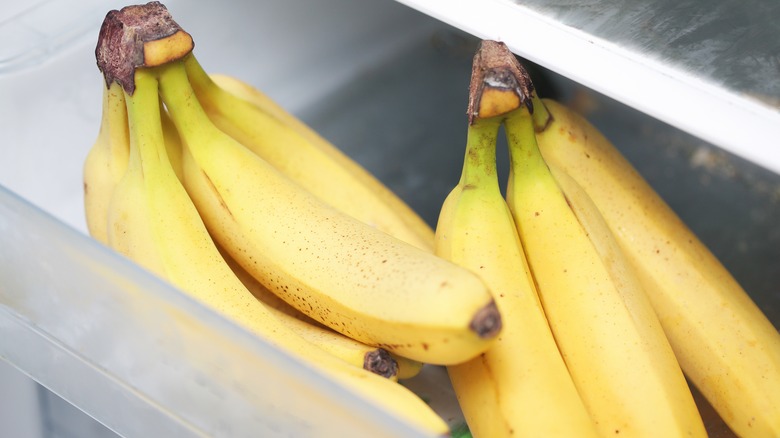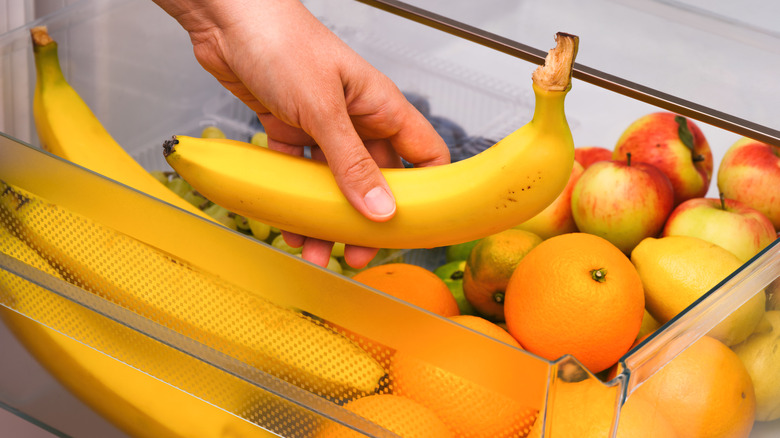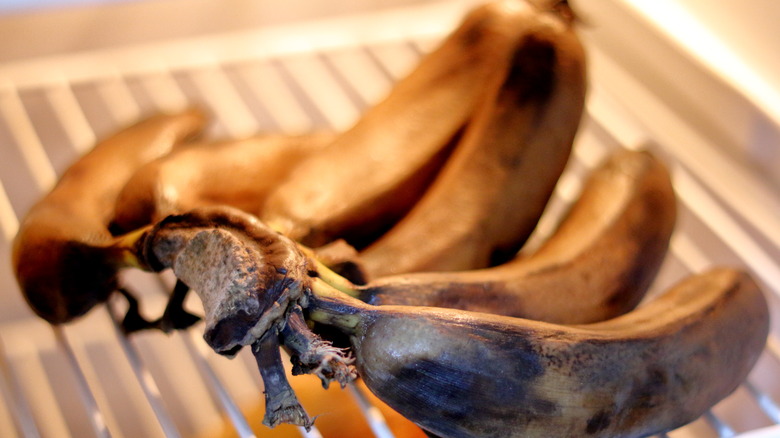Why You Should Be Storing Ripe Bananas In The Fridge
Bananas are a temperamental fruit. Catch them at the perfect time, and you've got a delicious and sweet snack; catch bananas at the wrong time, however, and you've got browning mush. The key to keeping bananas nice and ripe is to store them in the fridge. The climate of the refrigerator slows down the ripening process, but this storage method is also all about timing: When bananas hit their ideal ripeness, the fridge can help this optimal stage last longer. Bananas need a cool, dry place to age properly, which is why keeping them out of direct sunlight is also important.
What someone considers to be the perfect banana ripeness is all about personal preference. Some people like them softer, and even a little browning on the outside could be okay for certain banana fans. On the other hand, we say the greener and firmer the better. Whatever stage of ripeness you prefer, here are the dos and don'ts of keeping bananas ripe in the refrigerator.
How to store bananas in the fridge
Whether you're caramelizing your bananas for an even sweeter banana bread, cake, or another dessert, or blending them up in a smoothie, there's sometimes just not enough time to use all the bananas in a bunch before they're past their prime. This is where the refrigerator can be your best friend. In addition to storing ripe bananas in the fridge to delay further ripening, you could also wrap the banana stems in plastic to keep them fresh and yellow longer. Bananas emit ethylene gas as they age, and it mainly comes from the stems. The plastic wrap helps to prevent the gas from reaching the rest of the banana body and speeding up the ripening.
Whether storing ripe bananas in the refrigerator or at room temperature, it's also best to hang them from a hook, as this helps prevent bruising amongst the bunch. You could also go even colder and freeze bananas to completely suspend the ripening process at whatever point you choose — but just like with refrigeration, it's best to do this when the bananas are already ripe. Unripe frozen bananas can be difficult to work with.
What happens to bananas in the refrigerator
Although storing ripe bananas in the refrigerator can help them to last longer, there are some downsides to this storage method. For example, doing so before they're actually ripe can ruin the taste and the ripening process as a whole. Greener, firmer bananas stored in the fridge, then, likely won't ripen and will remain too hard to enjoy. This stall in the ripening process can also lead to the fruit tasting bitter. Plus, while ripened, yellow bananas themselves will remain ripe, the outer peel of the banana will continue to age and blacken over time. The blackened bananas are perfectly safe to eat — unless you notice mold on them, or if the fruit on the inside is black as well. In that case, throw them away, because they've definitely gone bad.
If you wish to opt for a different storage method, it's worth pointing out that United States Department of Agriculture doesn't recommend making use of the refrigerator. Instead, the department states that it's best to keep bananas in a dry place that is between 60 and 70 degrees Fahrenheit.


